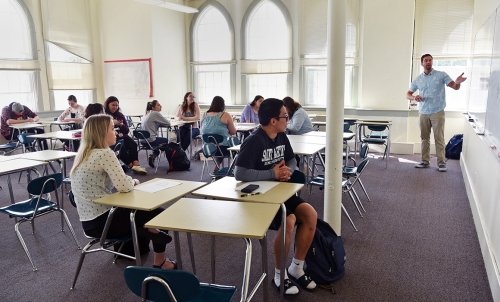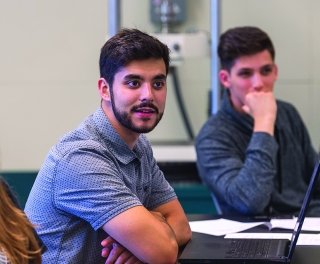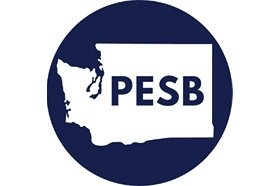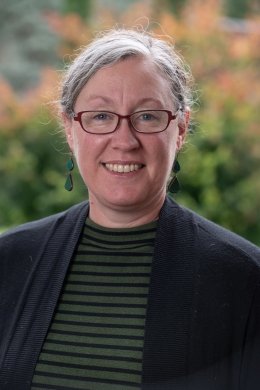
Secondary Teaching Alternate Route (STAR)
The STAR program is an accelerated option for our teaching certificate program for middle and high school with an available optional master’s degree route. This program is designed for students who already hold an undergraduate degree and who have at least one year of professionally oriented work experience. The MIT program can easily be added to the STAR program for those wishing to earn certification and a master's degree. Those looking for a non-accelerated route or for an elementary program are encouraged to explore our MIT program or our post-baccalaureate teaching certification program.
Jump to
Why Saint Martin's University?
The experiential STAR program offers classes on weekends to accommodate a year-long mentored internship in a local middle or high school, meaning that graduates will have connections in local school districts even before embarking on their careers. A wide variety of available subject areas (endorsements) and special pricing and innovative delivery make the program very reasonable and a tremendous value. STAR participants can choose one of two pathways, selecting either to receive the STAR certificate only or to fast track their studies and earn a Master in Teaching degree simultaneously with the certificate.
Federal aid
Federal financial aid is available for graduate students who will be enrolled at least half time and are citizens, or eligible non-citizens, of the USA. Most federal aid for graduate students is in the form of direct loans.
For more details about federal aid eligibility and the different types of aid available for graduate and professional studies visit: studentaid.gov.
Graduate Assistantships
Saint Martin’s University offers a limited number of Graduate Assistantships to graduate students. Contact the Office of the Provost for more information.
Admission requirements
The following are requirements for full and unconditional admission* to the STAR program applicants must meet the following requirements.
- Baccalaureate degree from a regionally accredited (or equivalent) college or university with an overall 3.0 undergraduate GPA or graduate coursework GPA (those not meeting these criteria may be admitted conditionally).
- Completion of all three subtests of the WEST-B exam. SAT/ACT scores can supplement the WEST-B exam requirement. If you plan to use this test in place of the WEST-B exam, you will need to provide an official score report of the exam.
- Applicants must have at least one year of professionally oriented work experience.
- Moral character and personal fitness qualifications as adopted in the Washington Administrative Code for teachers.
- The WEST-E/NES must be completed before being accepted into the program.
- Additional credits for endorsement competencies may be required, based on your transcript review.
- Current certification in CPR and First Aid for Adults and Children.
- Completion of all three subtests of the WEST-B exam.
- SAT/ACT scores can supplement the WEST-B exam requirement. If you plan to use this test in place of the WEST-B exam, you will need to provide an official score report of the exam.
Additionally, international students must submit proof of English proficiency in one of two ways:
- An undergraduate degree from a U.S. institution where English is the language of instruction or
- An official Test of English as a Foreign Language (TOEFL) or International English Language Testing System (IELTS) score report (less than two years old) sent directly from the testing agency. For full admission we require a 79 IBT/213 CBT/550 PBT on the TOFEL or 6.5 band score on the academic version of the IELTS.
Those students who do not meet the minimum required English proficiency but are otherwise admissible will be conditionally admitted through our ESL program.
Saint Martin's University is the sole judge of an applicant's English proficiency.
*Students not meeting these requirements will be considered for conditional admission. Saint Martin's University recognizes that while previous performance is a valuable indicator of potential success there are those who have demonstrated that potential in other ways than traditional academic performance.
Certificate requirements
The number of credit hours and course requirements for the STAR program depend on which option is chosen, either STAR - Certification only or STAR - Master's in Teaching (MIT).
STAR - Certification only - 43
STAR - MIT 40-45
In addition to these total required hours, the student may need to complete pre-requirements and/or endorsement courses. For the MIT option, the choice of thesis or non-thesis will impact the number of required credit hours.
For a detailed explanation of all policies, procedures and requirements, students should consult the graduate academic catalog.
The following expandables are divided into your two pathway options, each including required coursework and a sample schedule.
Secondary Teaching Alternate Route (STAR) Requirements
Pre-professional courses (if not completed as an undergraduate):
- ENG 101: College writing I
- ENG 102: College writing II
- COM 106 or THR 211: Public speaking, acting or any communications
- PSY 101: Introduction to psychology
- ED/PSY 205: Child and adolescent development
- ED 204: Introduction to education
- MTH 101: College level math or above
- ED 202 or SOC 396: Diversity in educational systems or intercultural communications
- HIS XXX: United States history
- HIS XXX: World history
- HIS 326: Pacific Northwest history
- Natural science course: Natural science with lab
STAR courses
Must be taken at the undergraduate level. (43 credit hours):
- ED 306X: Curriculum and instruction (3)
- ED 370X: Classroom assessment (3)
- ED 468X: Secondary literacy (3)
- ED 362X: Issues of abuse and ed law (3)
- ED 360X: Classroom management (3)
- ED 426X: Language acquisition methods (3)
- ED 484X: Secondary methods (3)
- TED 312X: Technology in the classroom (3)
- ED 498X: Student internship seminar (2)
- SED 359X: Introduction to exceptionality (3)
- ED 494X: Internship (10)
Program Schedule
Internship and coursework: September - May
Mentored full academic-year teaching internship in a school district.
Courses meet once a week on Saturdays during the day.
Example of schedule of classes
ATTENTION: please note that additional classes will very likely be required, and this will vary for each student depending on what endorsement areas are chosen, what credit is transferred in, and what pre-professional courses are needed.
Classes are offered at 2 levels for varying credit hours. Cert-only students take the courses at the undergraduate level (300 or 400), MIT students take the courses at the graduate level (500 or 600).
ATTENTION: please note that price per credit varies from undergraduate and graduate level courses.
Summer academy courses (6 weeks) (16 credits)
- ED 306: Curriculum and instruction (3cr)
- ED 370: Classroom assessment (3cr)
- ED 360: Classroom management (3cr)
- ED 362: Educational law and issues of abuse (2cr)
- ED 426: Language acquisition methods (3cr)
- ED 312: Educational technology (2cr)
Fall semester (12 credits)
- ED 484: Secondary Methods (3cr)
- ED 498: Secondary Literacy (3cr)
- SED 359: Introduction to Exceptionality (3cr)
- ED 487: Practicum (3cr)
Spring semester (12 credits)
- ED 492: Teaching Internship (10cr)
- ED 498: Teaching Internship Seminar (2cr)
STAR with MIT courses
Must be taken at the graduate level (40-45 credit hours):
- MED 506X: Curriculum and instruction (2)
- MED 570X: Classroom assessment (2)
- MED 568X : Secondary literacy (2)
- MED 562X: Issues of abuse and education law (2)
- MED 560X: Classroom management (2)
- MED 526X: Language acquisition methods (3)
- MED 584X: Secondary methods (2)
- MED 512X: Technology in the classroom (2)
- MED 598X: Student internship seminar (2)
- MED 559X: Introduction to exceptionality (2)
- MED 598X: Internship (5)
- Thesis or non-thesis option (3-7)
Program Schedule
Internship and coursework: September - May
Mentored full academic-year teaching internship in a school district.
Courses meet once a week on Saturdays during the day.
Example of schedule of classes
ATTENTION: please note that additional classes will very likely be required, and this will vary for each student depending on what endorsement areas are chosen, what credit is transferred in, and what pre-professional courses are needed.
Classes are offered at 2 levels for varying credit hours. Cert-only students take the courses at the undergraduate level (300 or 400), MIT students take the courses at the graduate level (500 or 600).
ATTENTION: please note that price per credit varies from undergraduate and graduate level courses.
Summer academy courses (6 weeks)
- MED 506: Curriculum and instruction (2cr)
- MED 570: Classroom assessment (2cr)
- MED 560: Classroom management (2cr)
- MED 562: Educational law and issues of abuse (2cr)
- MED 526: Language acquisition methods (3cr)
- MED 512: Educational technology (1cr)
Fall semester
- MED 584: Secondary Methods (2cr)
- MED 598: Secondary Literacy (2cr)
- MED 559: Introduction to Exceptionality (2cr)
- MED 587: Practicum (3cr)
Spring semester
- MED 592: Teaching Internship (5cr)
- MED 598: Teaching Internship Seminar (2cr)
STAR MIT - remaining coursework following internship
Coursework needed to complete MIT program and or endorsements. Classes offered per regular MIT schedule at Saint Martin's University or extended learning locations.
- Educational research methods: MED 601 (3cr)
- Diversity and social context: MED 605 (3cr)
- Foundations for educational practice: MED 607 (3cr)
- Thesis or non-thesis exit option (3-7cr)
How long does the STAR program take?
The length of the program will depend on how much transferable coursework students bring in from their undergraduate degrees towards their endorsement areas. For certification-only, the program can take as little as one year, for the MIT option, the program can be completed as quickly as a year and a half (again, depending on endorsement requirements and undergraduate coursework transferability).
What is the class size?
Classes are purposely kept small (typically between 10 to 15 students) so that students can engage in collaborative learning activities with their colleagues and instructors can offer strong support for students’ success.
What are the employment opportunities?
The Office of Superintendent of Public Instruction posts links to current offerings. Those candidates open to relocating can often secure a position more quickly.
Do I have to be a Catholic to attend Saint Martin’s University?
Saint Martin's University welcomes people of all beliefs.
Is the program accredited?
Saint Martin's University is regionally accredited by the Northwest Commission on Colleges and Universities. The State of Washington Professional Educator Standards Board recently reviewed Saint Martin’s University and granted full approval of five years.
What if I have more questions?
Contact the Office of Graduate Studies at 360-412-6142 or the STAR Program Director, Dr. Eric Boyer, at 360-438-4335.
Secondary Teaching Alternate Route (STAR) at a Glance
- Degree
- Certificate
- Program Type
- Certificate
- Campus
- Main (Lacey)
- Type of Instruction
- In Person

 Academic Excellence
Academic Excellence
 Community
Community










